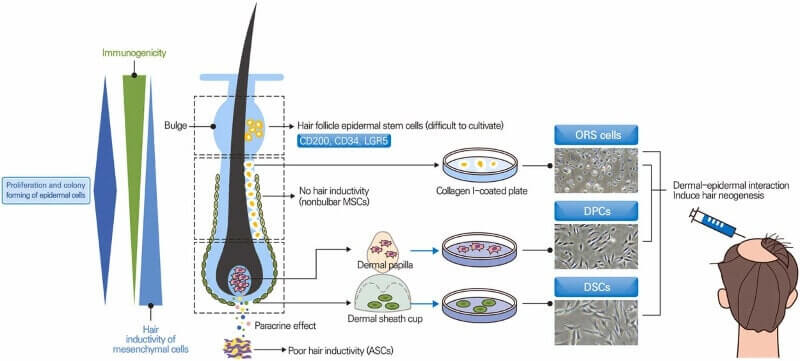Update: Epibiotech CEO Sung (who is the author of the new paper covered in this post) is answering our questions in the comments this week. Please note that English is not his first language.
Earlier this month, Epibiotech CEO Jong-Hyuk Sung published a detailed new paper titled “Effective and economical cell therapy for hair regeneration.” It was widely covered in South Korean media (h/t “Theo”, who also sent me this update on Mr. Sung’s presentation covering the paper). They call him Seong Jong-Hyeok in that article.
My interest piqued when I read such a thorough scientific paper from a CEO (almost unheard of in this industry). I showed it to a well known hair transplant doctor, and he found it to be a great summary. I also e-mailed one of Epibiotech’s media representatives with some questions, but no response so far.
Adipose, Dermal Papilla and Dermal Sheath Cells
Note that Dr. Sung has publiched numerous papers on adipose-derived stem cells (ADSC) and hair regeneration (and wound healing) for 15 years. This CEO seems to be a scientist first and foremost, rather than a business person.
This latest paper covers the three main types of cell based hair regeneration treatment strategies that are currently being developed:
- Adipose-derived stem cells (ADSC or ASC).
- Dermal papilla cells (DPC).
- Dermal papilla epithelial cup cells, better kown as dermal sheath cup cells (DPSC or DSC).
The paper also mentions the manufacturing of hair organoids using induced pluripotent stem cells. Including a shout out to Dr. Takashi Tsuji.
- Note that Shiseido (including its use of Replicel’s technology) is working on a hair regeneration treatment involving culturing of dermal sheath cup cells. More details here.
- Also note that in the past, Aderans and Intercytex both saw some success in hair growth via dermal papilla cell culturing and injection into balding scalps. HairClone is currently trying something similar.
Dr. Sung’s company Epibiotech is ultimately driven by “Off-the-shelf” allogeneic DPC therapy. It aims to begin Phase 1 clinical trials for its EPI-001 dermal papilla cell hair multiplication treatment in 2023. We are all hopeful that things will move faster in Asia in comparison to the US or Western Europe. The company can already mass-produce dermal papilla cells with hair growth ability using spheroid culture, hypoxic conditions, and growth factors.

Adipose Derived Stem Cells
Given the author’s background, the paper is especially detailed when it comes to ADSC (ASC). Dr. Sung highlights the pros and cons.
- Adipose-derived stem cells are easy to access and isolate in large quantities. This is not true when it comes to dermal papilla cells and dermal sheath cup cells.
- While ASCs promote hair growth through the paracrine effect, they have a poor potential in hair neogenesis. Dr. Sung suggests further development in methods to enhance the trichogenecity of ASCs.
Other New Studies on Hair Regeneration
As if this was not enough, two new papers on hair regenearation came out in the past month.
- A lierature review from Japan coveres numerous cell therapies for hair regrowth. This includes mesenchymal stem cell (MSC) implantation. Adult sources of MSC include: adipose tissue (including SVF); bone marrow; DPC; DSC; placenta and umbilical cord. The paper also analyzes non-cell therapies, including exosomes, extracellular matrix, platelet-rich plasma, and the MSC secretome. The last mentioned “comprises bioactive materials, such as growth factors, cytokines and nucleic acids that play an important role in regulating the hair follicle cycle and regeneration”.
- A new study from China on microenvironmental reprogramming of human dermal papilla cells for hair follicle tissue engineering.
- And finally, a recent video on regenerative medicine for hair loss starring Dr. Jerry Cooley (interviewed by Dr. Robert Haber).